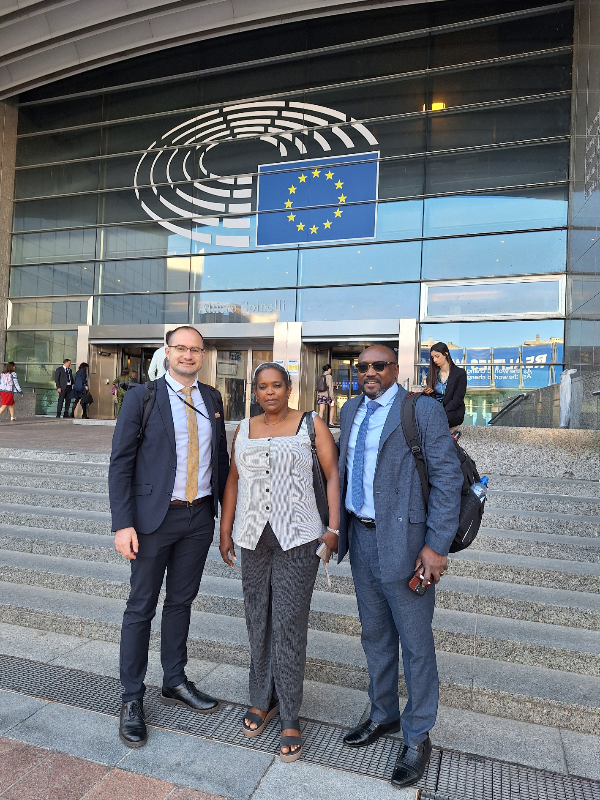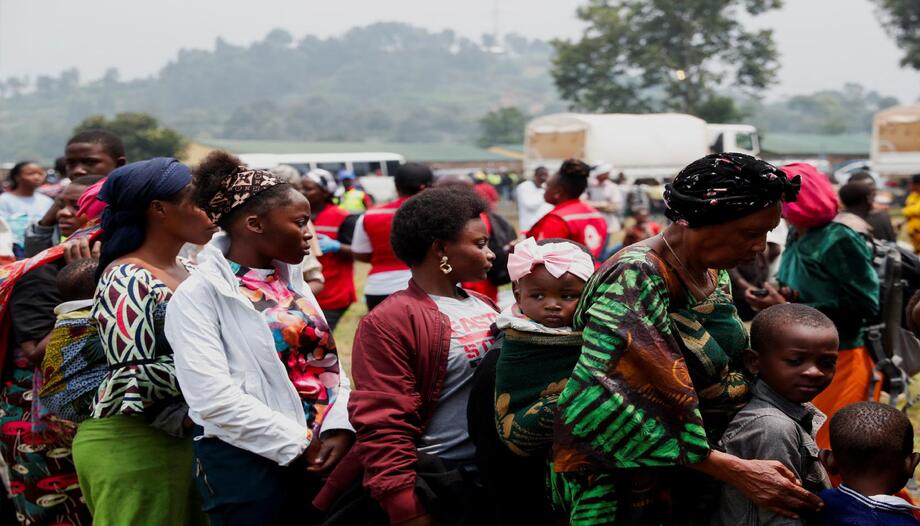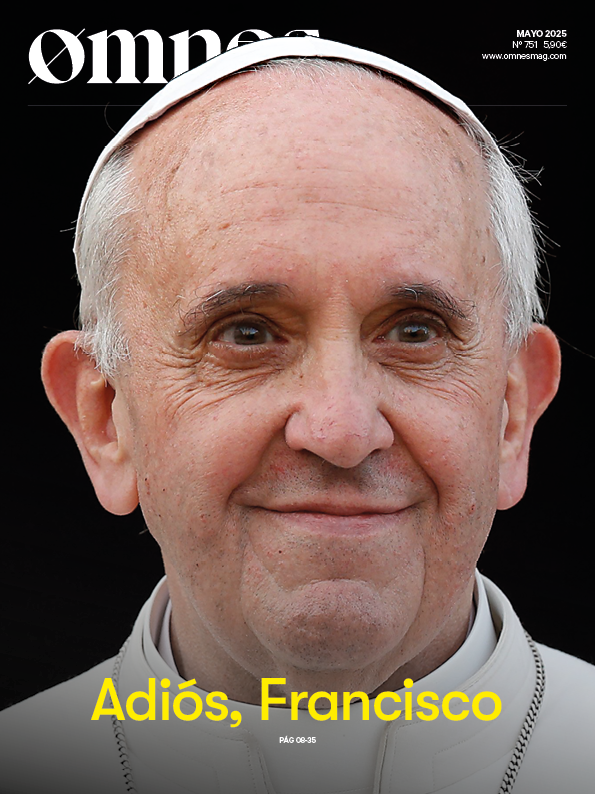The Congolese Camille and Esther Ntoto, co-founders of African New Day, denounced this week, in an interview with the European Center for Law and Justice (ECLJ), in the European Parliament, the violence and persecution of terrorist groups and armed militias against Christians. This is taking place in the east of the Democratic Republic of Congo, the eleventh largest country in the world and the second largest in Africa.
The drivers of African New Day in the United States and Belgium, working in partnership with organizations based in Goma, have referred to the causes of this conflict between the Democratic Republic of Congo (DRC), armed groups and Rwandan militias, mentioning which armed groups are persecuting Christians and taking away the natural resources of the country.
Thanks to ECLJ's support, Camille and Esther Ntoto were able to meet with some fifteen influential members of the European Parliament, as well as representatives of the European Commission and the European External Action Service (EEAS).
Balance and consequences of a deadly war
His speech could be divided into a few sections: What is happening in the Congo. Europe. Whether there is religious persecution. The role of Rwanda. Raw materials. Let's follow this thread, but with some premeditated disorder, according to the statements of the promoters of 'African New Day' to ECLJ.
More than 6 million dead and 7 million internally displaced persons is the terrible balance of thirty years of conflict, the deadliest war since World War II.
In summary, it could be noted that among the dozens of terrorist groups and armed militias present in the area, the Allied Democratic Forces (ADF) have joined the Islamic State and are persecuting Christians in the east of the Democratic Republic of Congo (DRC).
Camille Ntoto states that "This ongoing war is the most serious humanitarian crisis since World War II. There has never been a conflict in the world that has provoked the kind of crisis we are now experiencing in eastern DRC. It is curious to note that Rwanda is a leader in exporting materials from the soil and subsoil."
Consequences of the Rwandan genocide
"For 30 years there has been a war that is, in fact, the consequence of the Rwandan genocide that took place in 1994 and the genocidaires left Rwanda to take refuge in eastern DRC, where there has been instability ever since, instability and insecurity, with the interference and involvement of foreign forces, along with the Congolese army's attempt to defend its soil," Camille assures.
"I have talked about the humanitarian crisis. There are several armed groups operating now. One of the groups we hear most about is M vingt-trois, which is supported by the Rwandan government, with Rwandan soldiers."
"The chaos in the east of the Democratic Republic of Congo has made it possible", in his analysis, "for another group that initially stood against the legitimacy of the Ugandan government to take refuge in the east of the Democratic Republic of Congo and to initiate terrorist and intimidation operations".
And that it mixes with other entities on the ground, "to then seize economic resources, in particular cocoa production. In another stage of its evolution, this ADF group joined forces with the Islamic State, AISSIS".
Threatened Christians
There, "their effort is now to be able to suppress the expression of faith of Christians through the churches, but also of the other Christian entities that exist. Through the destruction of these churches, threaten Christians and claim that forced conversions to Islam are their hobbyhorse. Thousands of people have been victims of this. Many people, still today, because of their faith in Jesus Christ, are targeted by the ADF group. Unfortunately, many have perished and Esther has testimonies about this."
Elderly Jean-Pierre
Esther Ntoto now takes the floor. She recounts dramatic scenes, reminiscent of the early Christians.
"There are people who have come face to face with a group of ADF and have been burned alive for refusing to renounce their faith. We have photos of the burned body of the elderly Jean Pierre, last March and today his wife and children have traumas and his wife faints very often almost every day.
This is also the case of one of our sisters who was in charge of the women's group in a church who went, as she did every week to meet with the other women and when she came back from church, Deborah met a group that asked her to renounce her faith. She said no several times and they told her: we are going to make you suffer before you die".
Deborah
Esther continues: "And she began to sing to God. They raped her, stabbed her, and then put leaves and sticks all over her, and left her naked, thinking she was already dead. Some time later people returning from their fields found her there and were surprised to see her still alive. They took her to a medical center where she was able to tell them what had happened to her. She died there a few hours later.
Esther criticizes the fact that some people do not believe the stories.
"It is deplorable in this visit we have had here to the European Union and the European Commission especially, to hear that there are people who do not believe these stories," says Esther Ntoto in the video.
"They don't believe that thousands of men and women have been massacred because the ADF don't use firearms, they use bladed weapons, axes, knives and machetes. It breaks my heart. It is outrageous to even think that someone could make up a story like this. It's time for this to stop, it's time for this to end, it's time for people to know that there are Christians in Congo who are being beaten, who are being massacred because of their faith. This is a reality and it has to stop."

"Christians in the spiritual space of Europe, of the world."
The founders of 'African New Day' "are grateful that leaders of the European Union, of the European Commission, have wanted to take a step forward to review the agreements that have been signed with aggressors, and today we are talking about the Rwandan government that was the beneficiary of an agreement with the European Commission".
"A review has been put in place to prevent some of these crimes that are being committed in broad daylight, with impunity. This must stop. These Christians, even if they are not in the European space, they are Christians in the spiritual space of Europe, in the spiritual space of the world church. And we believe that there is hope for a resolution and an end to this situation, so that Congo can finally turn the page to an era of prosperity, they point out.
Very rich in raw materials: "let's not be hypocritical".
There is hardly any time left for economic analysis. Just some reference to what Camille and Esther Ntoto have commented. "We have to stop being hypocritical, because if Congo did not have the wealth it has, we would be at peace. We wouldn't even be here, but that's because Congo is a rich country and has all the wealth the world needs. We are talking about minerals, but we also have to talk about our biodiversity. The world needs it, and the future of the world cannot be counted without Congo," they say.
"If you have a mobile device, if you have a computer, an iPad or an electric car, chances are every day you use a little bit of Congo in a very ordinary way.Why? Because there are minerals that are used to make all the objects and gadgets I just mentioned, and they come from the Congo." "The minerals we are talking about are needed in the energy transition. Cobalt, coltan, lithium, copper and so on, they come from Congo, from Congolese soil."
In his opinion, "Rwanda is not the right country to deal with mining agreements. It is from Congo that the mineral resources come. "In Rwanda, we are talking about a tiny state with a population that cannot be compared to the 100 million Congolese," Camille says.








